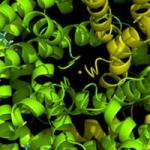
Eric Calvo, Ph.D.
Stadtman Investigator
Molecular Entomology Unit, Lab of Malaria & Vector Research
NIAID/DIR
Research Topics
Although the role of mosquitoes as vectors of viruses and parasites was first discovered in the late 1800s, little is known about the function of most mosquito salivary proteins and their effects on disease transmission. The overall objective of my research is to understand the mechanisms of the vector-host and vector-pathogen interactions at the biochemical and molecular level. My approach uses biological and biophysical methodologies to first identify the components of an interaction system (e.g., mosquito-arbovirus) and then to examine the mechanistic details of the interaction. A combination of bioinformatic analyses, recombinant protein production, assay development, and gene editing (based on the CRISPR/Cas9 system) are being used to accomplish this goal.
In the last decade, we have contributed to the analysis of several salivary transcriptomes from blood-feeding arthropods. This unprecedented insight into the complexity of salivary molecules indicates that their molecular diversity as well as the diversity of their targets is larger than previously suspected. The biological function of most salivary proteins and their relevance in blood feeding and pathogen transmission remain to be discovered. The exponential increase in transcriptomic and genetic data, in volume and complexity, demands novel and creative methods for functional analysis and annotation. We aim to extend the functional characterization of salivary proteins from blood feeding arthropods and their role in pathogen transmission. Ultimately, this information will be synthesized into an integrated model of the vector’s blood-feeding process and further the understanding of disease transmission and the host’s response to vector-borne diseases. The goal of this research program is to gain new insights into vector-host and vector-pathogen basic biology and, ultimately, to develop new transmission-blocking strategies for vector-borne diseases.
Biography
Dr. Calvo was born and raised in Havana, Cuba. He received his B.Sc. in biochemistry from the University of Havana, Cuba, and his Ph.D. from the Institute of Biomedical Sciences, University of Sao Paulo, Brazil. He did postdoctoral work at the University of California, Irvine, and at NIAID. Dr. Calvo became a staff scientist first at the FDA and then at NIAID, where he is now an Earl Stadtman tenure-track investigator and NIH Distinguished Scholar. The primary aim of his research is to enrich the functional annotation of disease vectors’ salivary proteins and provide a better understanding of their biologic function and potential involvement in pathogen transmission. His goal is to develop new control strategies to reduce or eliminate vector-borne diseases. He has also served as guest editor and reviewer for several scientific journals and international funding agencies.
Selected Publications
- Martin-Martin I, Valenzuela Leon PC, Amo L, Shrivastava G, Iniguez E, Aryan A, Brooks S, Kojin BB, Williams AE, Bolland S, Ackerman H, Adelman ZN, Calvo E. Aedes aegypti sialokinin facilitates mosquito blood feeding and modulates host immunity and vascular biology. Cell Rep. 2022;39(2):110648.
- Smith LB, Duge E, Valenzuela-León PC, Brooks S, Martin-Martin I, Ackerman H, Calvo E. Novel salivary antihemostatic activities of long-form D7 proteins from the malaria vector Anopheles gambiae facilitate hematophagy. J Biol Chem. 2022;298(6):101971.
- Shrivastava G, Valenzuela-Leon PC, Chagas AC, Kern O, Botello K, Zhang Y, Martin-Martin I, Oliveira MB, Tirloni L, Calvo E. Alboserpin, the Main Salivary Anticoagulant from the Disease Vector Aedes albopictus, Displays Anti-FXa-PAR Signaling In Vitro and In Vivo. Immunohorizons. 2022;6(6):373-383.
- Liu S, Xia X, Calvo E, Zhou ZH. Native structure of mosquito salivary protein uncovers domains relevant to pathogen transmission. Nat Commun. 2023;14(1):899.
- Valenzuela-Leon PC, Campos Chagas A, Martin-Martin I, Williams AE, Berger M, Shrivastava G, Paige AS, Kotsyfakis M, Tirloni L, Calvo E. Guianensin, a Simulium guianense salivary protein, has broad anti-hemostatic and anti-inflammatory properties. Front Immunol. 2023;14:1163367.
Related Scientific Focus Areas

Microbiology and Infectious Diseases
View additional Principal Investigators in Microbiology and Infectious Diseases

Molecular Biology and Biochemistry
View additional Principal Investigators in Molecular Biology and Biochemistry



This page was last updated on Monday, July 24, 2023